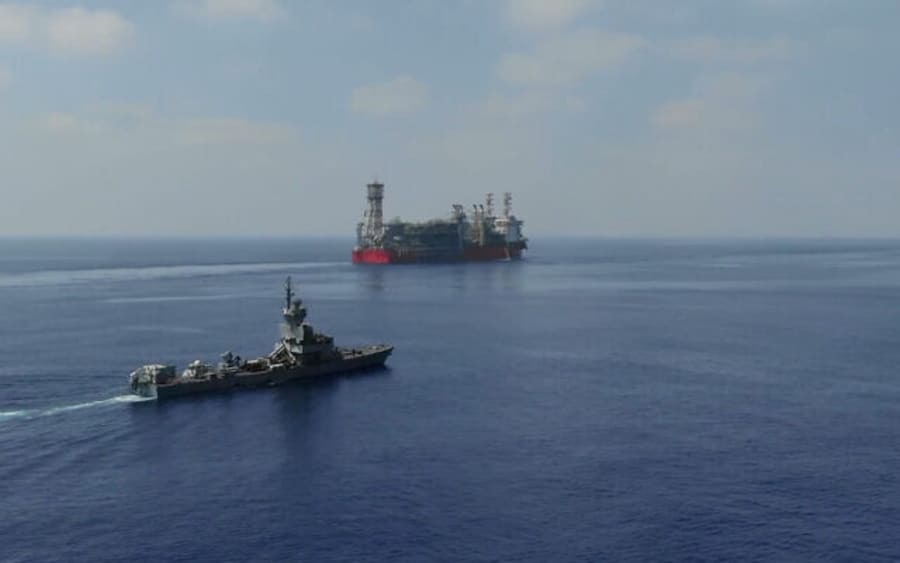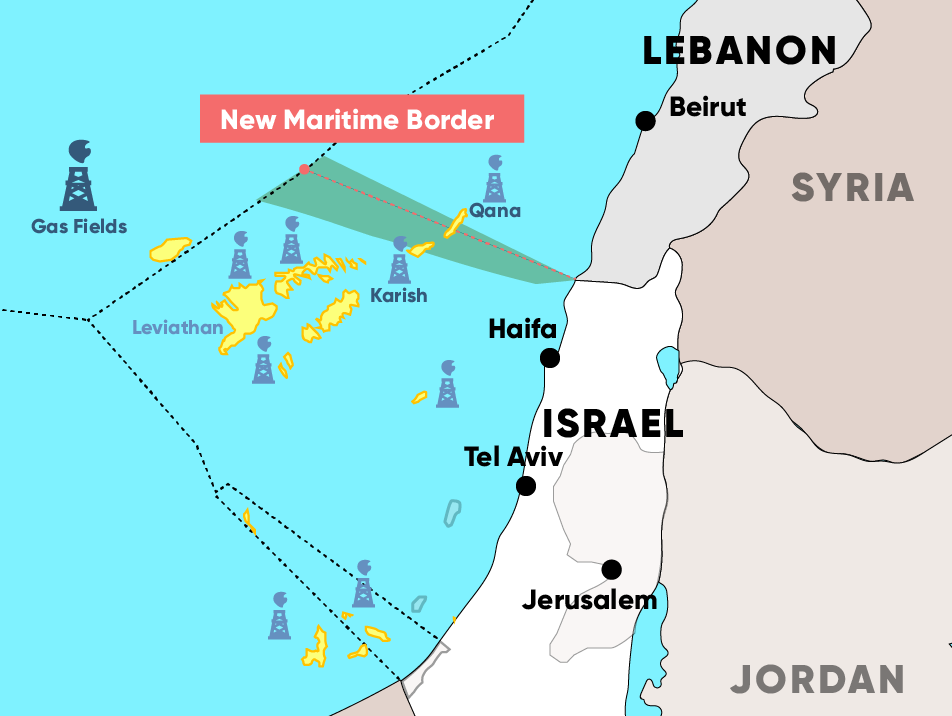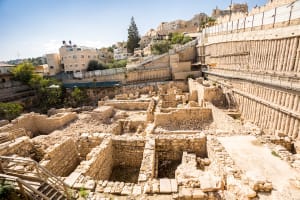Did Israel give up territory or gain economic security in maritime deal with Lebanon?
Or is it political fodder? It depends who you listen to – and who is running in the election less than three weeks away

Israel’s Security Cabinet ratified the agreement on a maritime border with Lebanon which will now go on to the full Cabinet for approval in two weeks and the Knesset for a review, but not a vote.
“This is a great achievement for the State of Israel, for Israel’s security and for Israel’s economy,” Prime Minister Yair Lapid said at a press conference.
“This agreement staves off the possibility of a military clash with Hezbollah,” he added, and “instead of war: brings the people of Israel billions in revenues and energy security for years to come.”
Earlier in the day, Lapid said there was importance and urgency in reaching the maritime agreement between Israel and Lebanon.
"The members of the Security Cabinet express their support for the government of Israel to advance the agreement,” Lapid said after the vote.
All members of the Security Cabinet voted in favor of the agreement except for Interior Minister Ayelet Shaked who abstained. Shaked wants the full Knesset to vote on the agreement. Lapid’s office said that he would invite opposition leader Benjamin Netanyahu to a security briefing on the deal.
WHAT WAS AT STAKE?
Some 330 square miles (860 square kilometers) in the Mediterranean Sea are in question – critical because several gas fields have been discovered in the area. Israel has already claimed the Karish natural gas field, but the area in dispute contains the Qana field.
The agreed-upon border – brokered by the United States since Israel and Lebanon do not have diplomatic relations – slices through the southern portion of Qana. Israel will be compensated for gas produced from approximately 17% of Qana, Lapid said.

With a dire economic crisis, Lebanon could use gas reserves from Qana to aid a financial recovery.
Also at issue is Israel’s election on Nov. 1. The two-week deadline for the full Cabinet vote slides in right before the heated contest that mainly pits Lapid vs. Netanyahu – as it does with this agreement as well.
Netanyahu said the deal brings Iran to Israel’s northern border and “gave Hezbollah our territorial waters, our sovereign territory, our gas, and in the end they succumbed to another Hezbollah demand to allow Iran to drill gas off the coast of Israel.”
The former prime minister criticized the process, as well, which allowed a significant deal to go through with less than three weeks left of a transitional government and without a full Knesset vote.
“How do you even allow such an agreement to be signed by a transitional government a few days before the elections?” he said.
Former Prime Minister Naftali Bennett – a right winger – came right down the middle saying that the deal, while “not a historic diplomatic victory, is also not a terrible capitulation.”
But is this deal good for Israel as Lapid says or an illegal capitulation as Netanyahu says? Pundits have been lining up over the past few days to praise – or castrate – the deal and its makers.
WHAT ARE THE CONS?
David Schenker of the Washington Institute for Near East Policy called it a “bait-and-switch” tactic by Lebanon luring Israel into a mediocre deal – “a remarkable turn of events, especially given Beirut’s profound lack of leverage.”
“Despite their weak hand, however, Lebanese negotiators won the day by employing a time-tested bait-and-switch negotiating tactic," he wrote. "Immediately after talks commenced, Lebanon changed its position, demanding an even larger exclusive economic zone.”
Schenker explained: Beirut’s demanded the area down to the ’29’ line – basically everything – freezing the talks. When they restarted, Lebanon accepted a return to the 23 line making it look like huge concession, he wrote.
Right-wing columnist Caroline Glick decried the deal between Israel and an “Iranian terror proxy.” She said money that Lebanon earns from the gas reservoir will go straight to Hezbollah.
“Lapid, (Defense Minister Benny) Gantz and their allies portray the deal as a diplomatic and strategic masterstroke. By surrendering to all of Hezbollah-controlled Lebanon’s 12-year-old demands, they brag that Israel has secured its ability to develop Karish. In other words, they’re bragging that they’re signing a protection deal with Hezbollah,” she wrote.
Glick said that Lebanon and the U.S. negotiators managed “to compel Lapid and Gantz to agree to give up a hundred percent of the disputed waters.”
“But now that Lebanon has already tipped its hat to its next demand, and given that Lebanon is not obliged by the boundary line Israel has accepted, it’s obvious that Lebanon will disavow the deal at a time of Hezbollah’s choosing,” Glick predicted.
WHAT ARE THE PROS?
Yaakov Katz, editor-in-chief of The Jerusalem Post, called the argument that the agreement constituted a surrender of territory “disingenuous.”
“EEZ (Exclusive Economic Zone) is not territory. It is the right to exploit natural resources. Giving up that right is economic, especially when taking into consideration the fact that under the deal, Israel is supposed to receive royalties,” he argued.
He also was optimistic that this could break Lebanon’s dependence on Iran for financial support.
Dan Shapiro, former U.S. ambassador to Israel, credited U.S. President Joe Biden’s special envoy, Amos Hochstein, for coming up with a new approach – focusing on Lebanon’s need to extricate itself from an economic and energy crisis and Israel’s need for quiet while drilling at Karish.
“Quiet comes from Lebanon’s own incentive to ensure there is no conflict, so its gas (assuming commercially viable deposits are found) in the Qana field that straddles the border can flow, while Israeli gas can flow unmolested in the adjacent Karish field, which is nearly ready for production. In addition to heading off a potential conflict in the north, the agreement ensures Israel will receive its proportionate share of royalties from the shared Qana field, protecting its economic interests,” he wrote.
Netanyahu’s own former national security advisor, Yaakov Amidror, insisted in an August interview that “there is no territorial question here, but only a question of interpretation of international law” about where the line should go.
“In the end, the question is economic, because we want to maximize our profits from the sea,” he said in this interview published in Maariv (in Hebrew).
“No, it's not about territory, but about the economy. Territory is where the border of the State of Israel passes, there are maps, that's clear, and we're fighting for it to the last meter.”
Meanwhile, the heads of the Mossad, Shin Bet and the Israel Defense Forces agreed that despite its muted acceptance of the deal, Hezbollah – the Iran-funded terror group based in southern Lebanon – does not benefit from the deal.
Should Netanyahu be able to form a government after the Nov. 1 election, he said he will challenge the legality of the deal.

Nicole Jansezian was the news editor and senior correspondent for ALL ISRAEL NEWS.













